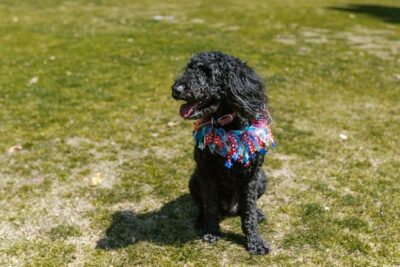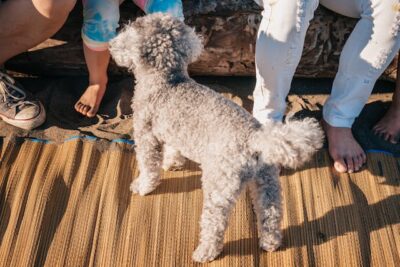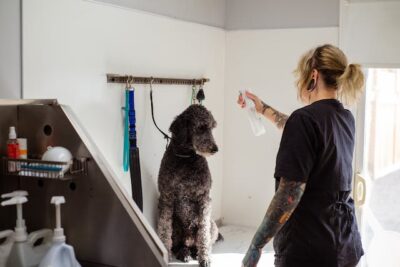Overview
Introduction: Are Poodles Hypoallergenic

Allergic to dogs but dreaming of a furry friend? Are Poodles Hypoallergenic? Enter the Poodle, a breed often touted as hypoallergenic, making it a popular choice for allergy sufferers.
In the realm of hypoallergenic dog breeds, Poodles stand out. Let’s explore whether this claim is more than just a pet lover’s wishful thinking. Dive into the fascinating world of Poodles, hypoallergenic dogs, and discover the truth about Are Poodles Hypoallergenic and ideal dog breeds for allergy sufferers.
Definition of Hypoallergenic dog breeds
To start, what does “hypoallergenic” really mean? It’s not just a trendy term; it implies a reduced likelihood of triggering allergies. So, can Poodles live up to this promise? Hypoallergenic dogs, like Poodles, are often favored by people with allergies due to their ability to produce fewer allergens. These breeds are known for shedding less dander, resulting in fewer allergens in the environment.
For individuals with severe allergies, this can mean a reduced likelihood of experiencing an allergic response. Let’s delve into the world of hypoallergenic dog breeds and explore whether Poodles can truly provide a solution for those seeking canine companionship without the worry of severe allergic reactions.
Popular Beliefs about Poodles
Before we uncover the science, let’s explore the popular beliefs surrounding Poodles and their hypoallergenic nature. Spoiler alert: It’s not just about shedding. When it comes to hypoallergenic dogs, the focus often turns to shedding, and Poodles are frequently cited as a prime example.
Contrary to the common misconception that all dogs shed, Poodles, especially certain poodle breeds like the purebred poodle, are known for their minimal shedding. This characteristic plays a pivotal role in their reputation as hypoallergenic companions. Let’s delve deeper into the dynamics of Poodles and their unique traits that contribute to their hypoallergenic status.

The Poodle Breed
Origin and History
Poodles, with their elegant curls and proud posture, have a rich history. Originating in Germany, these dogs were initially water retrievers. But how did they become the poster child for hypoallergenic pets? The answer lies in their unique traits, including the curly coat that minimizes shedding. This distinctive feature not only adds to the charm of Poodles but also contributes to their reputation as hypoallergenic dogs.
The popularity of Poodle mixes and the emergence of smaller variants like teacup poodles further accentuate their desirability among those seeking hypoallergenic companions. Let’s unravel the journey of these elegant dogs and understand how their curly coats have made them iconic in the realm of hypoallergenic pets.
Poodle Varieties and Sizes
Poodles come in three sizes: Standard, Miniature, and Toy. Each size has its own charm, but does size really matter when it comes to allergens? Let’s find out.

Standard Poodles
Standard Poodles are often considered hypoallergenic due to their minimal shedding and curly coat, which can be advantageous for individuals with dog allergies. While no dog is entirely allergen-free, Poodles, much like Portuguese Water Dogs and other dogs with similar coat types, tend to produce fewer allergens such as dander compared to breeds with more traditional dog hair.
This makes them a favorable choice for those seeking a companion without exacerbating allergy concerns. Even when compared to hairless breeds like the American Hairless Terrier or mixed breed dogs, Standard Poodles and similar breeds, including the Italian Greyhound, stand out as options that may be more suitable for allergy sufferers than breeds with denser or coarser coats like the German Shepherd.

Miniature Poodles
Miniature Poodles are renowned for being a hypoallergenic dog breed, making them an ideal choice for allergy sufferers. Due to their minimal shedding and curly coat, Poodles shed less dander, reducing the risk of triggering dog allergies.
This low shedding breed, including the teacup Poodle variety, is recognized for its compatibility with individuals prone to allergic reactions, as the dog’s coat minimizes the presence of allergens, enhancing the overall suitability of Miniature Poodles as pets for those with dog allergies.
Toy Poodles

Toy Poodles are often considered hypoallergenic, making them a suitable choice for allergy sufferers. Their minimal shedding and curly coat reduce allergens like dander and saliva. Compared to breeds like Bichon Frise and Yorkshire Terriers, Toy Poodles are known for being more compatible with allergies.
While no dog is entirely allergen-free, Toy Poodles stand out as options causing fewer reactions. Their hypoallergenic qualities make them popular for those seeking a smaller canine companion without worsening allergy concerns, even when compared to other poodle mixes and various dog breeds.
Understanding Allergies
Common Allergens in Pets
Understanding allergies in pets involves recognizing common allergens that dogs produce, with a primary source being the dog’s skin. While mixed breeds and even hairless breeds may vary in allergen production, it’s essential to note that all dogs, regardless of their coat type, can potentially trigger allergic reactions.
The American Veterinary Medical Association emphasizes that dense coats, commonly found in breeds like the German Shepherd or Husky, may contribute to a higher allergen load. Thus, awareness of these factors is crucial for pet owners and individuals prone to allergies, enabling informed decisions on selecting breeds and managing exposure to potential allergens.
Poodle Coat Composition
Understanding allergies in the context of poodles involves examining their unique coat composition. Unlike most dogs with a single coat, poodles have a distinct curly and dense coat structure. The composition of poodle coat samples reveals that their fur is less prone to shedding compared to other breeds. This characteristic is advantageous for individuals prone to allergies, as less shedding means fewer allergens like dander in the environment. The curly nature of a poodle’s coat helps trap hair and dander, minimizing their release into the air and reducing the likelihood of triggering allergic reactions in sensitive individuals.

Poodle Coats and Allergies
Hair vs. Fur: The Distinction
Poodle coats stand out in the realm of allergen considerations due to the unique distinction between hair and fur. Unlike most dogs that possess fur, poodles have hair, a key factor influencing their hypoallergenic reputation. The structural difference in poodle hair reduces shedding and minimizes the dispersal of allergens like dander into the environment.
This is particularly advantageous for individuals prone to allergies, as the curly and dense nature of a poodle’s coat helps contain potential allergens. Understanding this distinction between hair and fur sheds light on why poodles are often recommended for those seeking a canine companion while minimizing the risk of triggering allergic reactions.
How Poodle Coats Minimize Allergic Reactions
Poodle coats play a crucial role in minimizing allergic reactions, making them a popular choice for allergy-prone individuals. The unique curly and dense texture traps shedding hair and dander, reducing airborne particles compared to breeds with fur that scatters allergens more readily.
This characteristic benefits allergy sufferers by decreasing the likelihood of inhaling or coming into contact with allergens. Regular grooming further diminishes loose hair and dander, contributing to a cleaner environment for those sensitive to allergens. Understanding how poodle coats function in minimizing allergic reactions highlights their suitability as hypoallergenic companions.

Debunking Myths
Myth 1: Allergies Linked to Shedding
Contrary to popular belief, pet allergies aren’t solely tied to shedding. While shedding pets release allergens, factors like coat type and saliva protein also play a role. Breeds like poodles, with minimal shedding, challenge the notion that shedding alone causes allergies.
Recognizing these nuances dispels the myth and emphasizes the need for a more comprehensive understanding of pet-related allergies.
Myth 2: Size Matters in Allergenicity
Another common myth in the realm of pet allergies is the belief that the size of a pet determines its allergenicity. In reality, allergens are not size-dependent; rather, they are often associated with proteins found in a pet’s dander and saliva. Both large and small breeds can trigger allergies based on these protein factors.
Understanding that size is not the determining factor dispels this misconception, emphasizing the need to focus on individual breeds and their specific characteristics when addressing allergenic concerns.

Grooming Practices: Poodle Grooming Products
Importance of Regular Grooming
Regular grooming, whether through professional grooming or at-home care, holds significant importance in maintaining a dog’s overall well-being. Beyond aesthetic benefits, grooming helps prevent matting, reduces the risk of skin issues, and minimizes shedding.
For individuals prone to allergies, consistent grooming plays a crucial role in reducing the likelihood of allergic reactions by keeping the dog’s fur clean and lessening the presence of allergens like dander. Even breeds requiring minimal grooming can benefit from regular attention to ensure a healthy coat and mitigate potential allergenic factors.
Recommended Grooming Tools
Investing in the right grooming tools is essential for maintaining a pet’s health and appearance. A slicker brush is effective in removing loose fur and preventing matting, while a comb helps detangle and smooth the coat. Nail clippers are crucial for maintaining proper paw health, and specific ear-cleaning solutions can aid in preventing infections.
Additionally, toothbrushes designed for pets promote dental hygiene. Choosing the appropriate grooming tools ensures a comfortable and efficient grooming experience for both the pet and the owner, contributing to the overall well-being of the animal.

Tips for Allergy-Prone Individuals
Precautions for Prospective Poodle Owners
Navigating allergy symptoms as a dog lover can be challenging, but considering a hypoallergenic poodle is a thoughtful choice. “Are Poodles Hypoallergenic?” is a common question among those with allergies, and it’s important to note that while no dog is entirely allergen-free, poodles are often a suitable option due to their minimal shedding and unique coat structure.
To minimize the risk of allergic reactions, prospective poodle owners should take precautions such as regular grooming to control shedding and investing in hypoallergenic bedding. Creating pet-free zones in the home can also contribute to reducing allergen exposure. For individuals experiencing persistent allergy symptoms, consulting with a healthcare professional about allergy shots can be beneficial.
Monitoring reactions, such as a runny nose and other signs of the immune system response, ensures a harmonious companionship with a poodle while prioritizing the well-being of allergy-prone individuals.
Allergy Management Strategies
For those prone to allergies, effective management strategies include choosing hypoallergenic pets, maintaining a clean living environment, and consulting with healthcare professionals for personalized solutions.
Poodle Allergies vs. Other Breeds
Comparative Analysis
In a comparative analysis of poodle allergies versus other breeds, people with allergies may find poodles, known for minimal shedding, more suitable than some other breeds, like the Portuguese Water Dog, potentially reducing the risk of allergic reactions.
Factors Influencing Allergenicity
In comparing poodle allergies to other breeds, factors influencing allergenicity, such as coat type and shedding tendencies, play a significant role in determining the suitability for individuals with allergies.
Conclusion
In this journey through Are Poodles Hypoallergenic, we’ve uncovered the facts, debunked myths, and explored essential tips. The verdict? Poodles indeed stand out as a potential ally for allergy-prone individuals, offering both companionship and comfort. If you’re ready to welcome a hypoallergenic furry friend into your life, explore our selection of Poodle puppies for sale in Florida and surrounding areas.
Key Findings
- Poodle coats, being hair rather than fur, contribute to their hypoallergenic reputation.
- Size doesn’t determine allergenicity; all Poodle sizes can be allergy-friendly.
- Regular grooming and the right tools are crucial for managing allergens effectively.
Addressing Common Misconceptions
“Are Poodles Hypoallergenic?” is a common query, and it’s important to note that while no dog is entirely allergen-free, poodles are often considered hypoallergenic due to their minimal shedding and unique coat structure. This characteristic helps address common misconceptions about canine allergens, making poodles a potential choice for individuals with allergies.
FAQs: Are Poodles Hypoallergenic
- Q: Are Poodles hypoallergenic, or is it just a belief?
- A: Poodles are often considered hypoallergenic due to their minimal shedding, which can result in fewer allergens in the environment. However, it’s essential to note that no dog breed is entirely allergen-free, and individual reactions may vary.
- Q: Are Poodles the best dogs for people with allergies?
- A: Poodles are often considered one of the best dog breeds for individuals with allergies, but the suitability of a specific breed depends on individual reactions. It’s recommended to spend time with the breed before deciding to bring one home.
- Q: Do all Poodle varieties have the same hypoallergenic properties?
- A: While Poodles, in general, are known for producing fewer allergens, different Poodle varieties, such as standard, miniature, and toy, may have variations in coat types. It’s advisable to consider the specific breed characteristics for the best fit.
- Q: Why do some people claim that Poodles shed less hair than certain dogs?
- A: Poodles have a curly coat that tends to shed less hair compared to other breeds. This unique feature contributes to the perception that they are hypoallergenic, as less shedding generally means fewer allergens in the environment.




